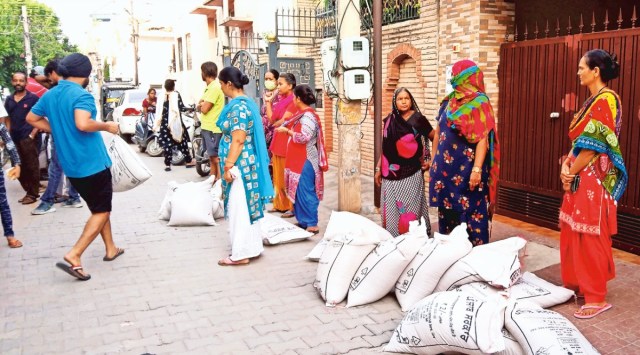Wheat flour (atta) prices continue to rise, with the all-India daily average retail price recorded at Rs 36.98 per kg on Tuesday, up 17.51 per cent from Rs 31.47 per kg recorded a year ago, according to official data.
The figures show the price of atta has become almost equal to that of rice (Rs 37.96 per kg) and has inched closer to sugar (Rs 42.69 per kg).

Retail price of wheat, too, has increased 12.01% — from Rs 28.34 per kg a year ago to Rs 31.77 per kg on November 22 this year.
Story continues below this ad
The data, supplied by the State Civil Supplies Departments and collated by the Department of Consumer Affairs (DoCA), is available on DoCA’s website.
Wheat and atta prices have been increasing since the beginning of this year mainly due to lower production (106 million tonnes) in the country and higher demand outside in the wake of Russia’s invasion of Ukraine. While the government banned wheat export on May 13 this year, actual shipments have doubled in the first six months (April-September) of the current financial year as compared to last year.
During April-September, India exported 45.53 lakh metric tonnes of wheat, up from 23.72 lakh metric tonnes exported during the same period last year. Similarly, atta export has also been higher. During April-September 2022, India exported 4.50 lakh metric tonnes of wheat flour, higher than 2.04 lakh metric tonnes during the same period last year.
The ban on wheat exports in May came amid a lower output of 106 million tonnes, lower procurement (18.7 million tonnes compared to 43.3 million tonnes last year), and rising domestic prices. However, two kinds of shipments were allowed: exports based on permission granted by the Centre to other countries “to meet their food security needs” and “on the request of their governments”; and contracted exports against which irrevocable letters of credit had already been issued.
Story continues below this ad
In August this year, the government banned atta export, too. However, the domestic prices of wheat and atta have seen a steady rise.
While prices have gone up, wheat stock in the central pool has come down to a historic low: as on November 1, 2022, wheat stock in the central pool was 210.46 lakh metric tonnes, nearly half that of 419.81 lakh metric tonnes recorded a year ago.
In view of the depleting wheat stocks and a lower procurement this year, the government had revised wheat and rice allocation under the National Food Security Act, 2013, and the Pradhan Mantri Garib Kalyan Anna Yojana for several states. For several states, the Centre had provided rice in place of wheat.
In September, this year, the Centre had extended the PMGKAY till December 2022.
Story continues below this ad
On Wednesday, Food Secretary Sanjeev Chopra told the media that the government had already put in place export regulations for wheat, flour (wheat) and broken rice, and as a result prices have “cooled down.” He said there has been a 10% to 15% increase in wheat prices compared to a year ago, but the increase is lower when compared from the date on which wheat export was banned.
“Export regulations were put in place in May; since then, the increase has been about 7%. If you factor in the MSP [minimum support price] increase, it is just about 3% to 4%, which I would say is not very high. This, of course, is a rise but not a rise which warrants some kind of action other than what we have already done,” he said.
Asked if the government plans to sell wheat under its open market sale scheme (OMSS), he said, “As of now we are watching the situation… As of now, we are just waiting and watching…”
Asked if the government will impose a stock limit on wheat, Chopra said, “The position right now does not warrant any kind of a measure other than what has already been done. In case, if we see any abnormal increase in prices, then obviously we will step in with measures in our command.”









